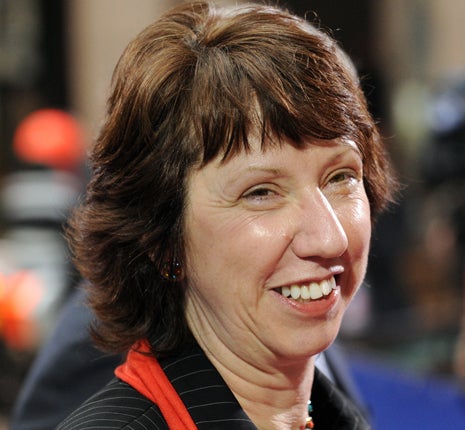Resignation of key aide upstages Ashton's foreign policy plans
Departure of spokesman from "a very tough job" casts shadow over the embattled EU Foreign Affairs head's fightback

Your support helps us to tell the story
From reproductive rights to climate change to Big Tech, The Independent is on the ground when the story is developing. Whether it's investigating the financials of Elon Musk's pro-Trump PAC or producing our latest documentary, 'The A Word', which shines a light on the American women fighting for reproductive rights, we know how important it is to parse out the facts from the messaging.
At such a critical moment in US history, we need reporters on the ground. Your donation allows us to keep sending journalists to speak to both sides of the story.
The Independent is trusted by Americans across the entire political spectrum. And unlike many other quality news outlets, we choose not to lock Americans out of our reporting and analysis with paywalls. We believe quality journalism should be available to everyone, paid for by those who can afford it.
Your support makes all the difference.The EU's new foreign policy chief Catherine Ashton suffered a fresh blow to her reputation yesterday, with the resignation of her chief spokesman even as she unveiled details of the almighty new European diplomatic service she will run.
Baroness Ashton's grand announcement yesterday on the 7,000-strong foreign service was meant to turn a page on weeks of embarrassing criticism which suggested she was out of her depth and not up to the demanding new job she occupies.
But hopes of asserting her authority were overshadowed by the announcement of her spokesman Lutz Güllner that he was leaving the post he has held since Lady Ashton was appointed at the end of last year.
"I had to consider my professional future and decided that it was elsewhere," Mr Güllner told The Independent, adding that he would work at the European Commission's trade department as of next week. He flatly denied press reports that he had slipped up on various occasions by making critical remarks about his boss's abilities, but admitted it had been "a very tough job".
Brussels sources said Mr Güllner had come under intense pressure after French newspapers blasted Lady Ashton for not travelling to Haiti in the immediate aftermath of the January earthquake and for her lack of foreign policy experience. In one incident, she reportedly lost her temper and blamed her spokesman directly for the negative press coverage. Mr Güllner said: "Cathy is in a very difficult position, mainly because of all the fighting between all the different EU institutions. But we have always had a good relationship and I believe I worked hard for her and did a good job."
The former NHS executive's appointment as de facto EU foreign minister stunned even EU insiders last December when she beat far more high-profile contenders to the post. Her only international experience was her one-year tenure as EU Trade Commissioner, a role she took over from Peter Mandelson.
She has struggled to recover from a jittery first few weeks, when she often deferred to more seasoned foreign ministers during meetings and put off travelling to the world's capitals. She has reportedly started learning French after fierce criticism in Paris about her linguistic deficiencies.
In her role as EU High Represetnative for Foreign and Security policy she wields enormous power within the EU, where she is responsible for shaping foreign policy on behalf of 27 member states. She will head up the European External Action Service (EEAS), a new diplomatic service created under the Lisbon Treaty which will put around 7,000 diplomats, a multimillion-euro budget and a string of EU diplomatic bureaus at her disposal. On a pay grade of almost £270,000 she is also one of the world's highest-paid officials.
Appearing more confident yesterday than in earlier press appearances, she said that she had delivered an ambitious proposal that would offer much more than "traditional diplomacy".
"The EEAS I want is one that helps to build a distinct European response to the 21st-century agenda. A service that represents the best that Europe has to offer," she said.
She also stressed that she had delivered the plan "ahead of schedule", evidently in an effort to squash predictions that she would be forced to delay the proposal amid squabbling between the national capitals.
However, the launch of the new service still risks being blighted by infighting as European capitals and rival EU institutions vie for power and key posts. Already there has been a struggle over which official diplomatic languages should be spoken – English, French, German – and disagreement over the appointment by the European Commission's President José Manuel Barroso of the EU's new ambassador in Washington. Meanwhile, the EU's newest members are worried that they will be under-represented in the service.
"It will be very hard to push this through each one of the 27 European capitals and the European Parliament, all of which will make demands on Catherine, because this new body will be there for decades to come. And then there is the question of how much it will cost," said one EU official on condition of anonymity. "Clearly she is not yet out of the woods."
The new service should be fully in place within two years, although the jury is still out on whether Lady Ashton has sufficient gravitas to preside over it.
Join our commenting forum
Join thought-provoking conversations, follow other Independent readers and see their replies
Comments